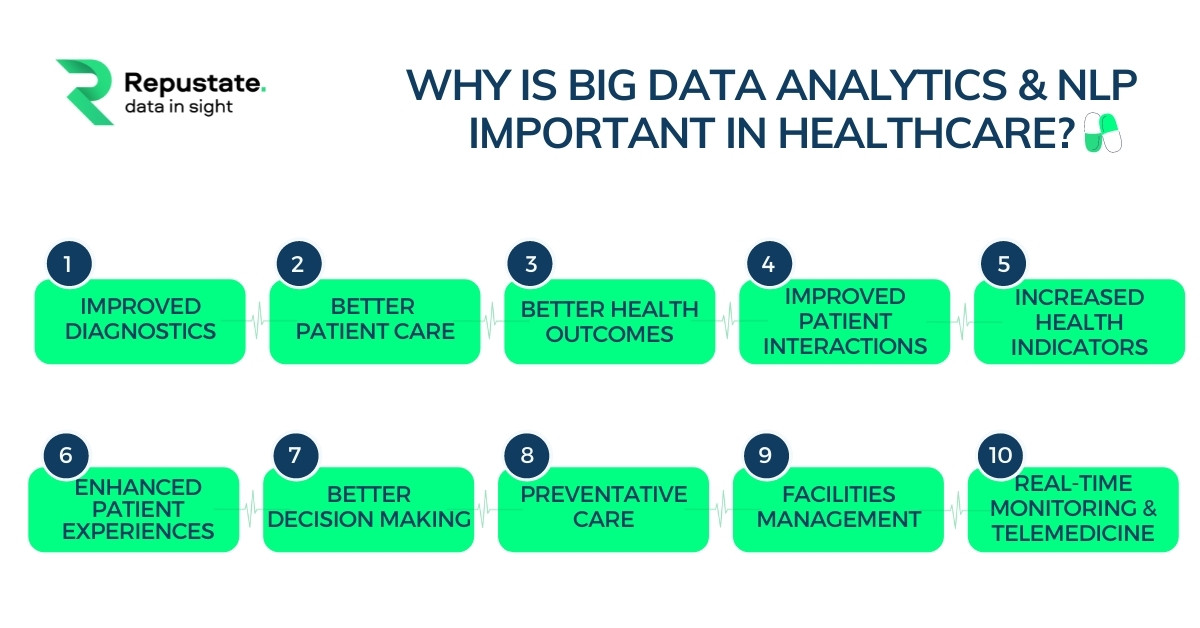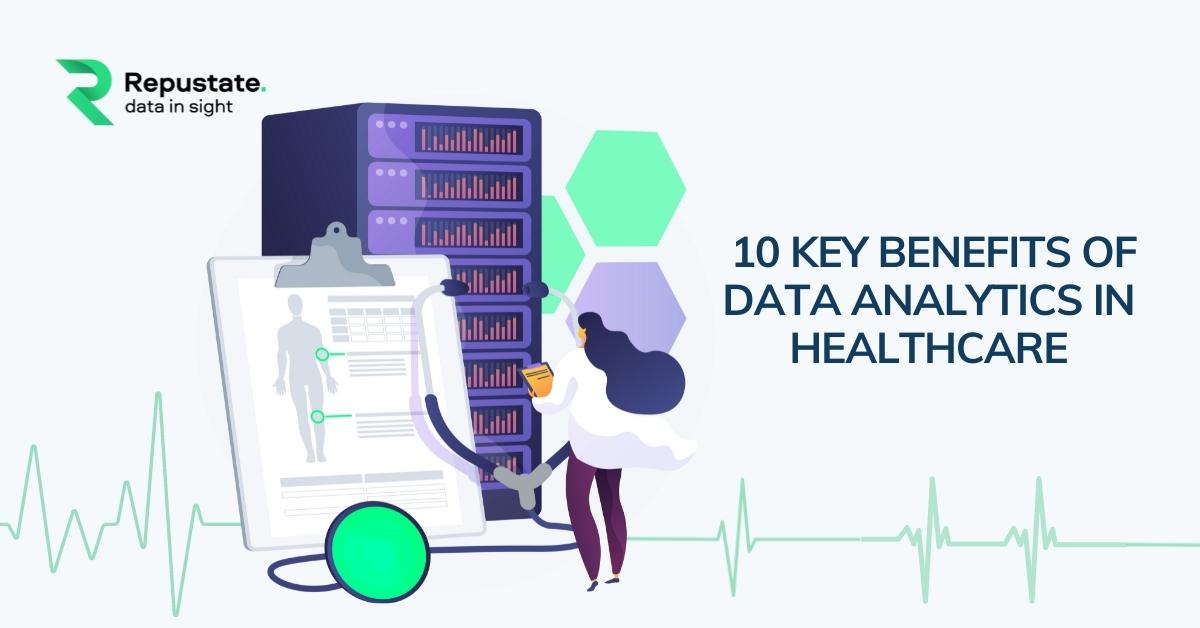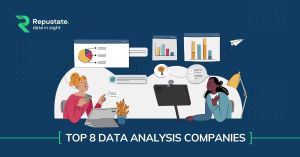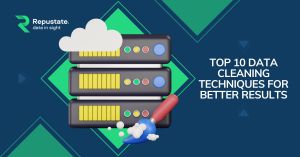10 Key Benefits of Data Analytics in Healthcare
Benefits of data analytics has lead to increased efficiency, enhanced decision-making ability, and productivity across a variety of industries. The healthcare industry is no exception. Healthcare big data promises several benefits which includes everything from better patient treatment to better health outcomes and improved diagnostics. Natural language processing or NLP in healthcare has changed the way doctors and medical professionals use, manage, and analyze critical healthcare data and utilize it in the healthcare industry. NLP has given healthcare providers the ability to implement patient voice in their operations which allows them to deliver improved patient experiences.
So let’s look in detail at how data analytics have changed in recent years and why big data analytics and NLP is so important in healthcare.
How Has Data Analytics Evolved in Healthcare?
Big data analytics in healthcare plays a crucial role in the healthcare system. For instance, some of the main benefits of data analytics is that it allows medical professionals and clinicians to treat patients better and faster, diagnose patients more accurately, improve preventative medicine, and enhance patient outcomes. Ultimately, it also improves the patient experience (PX).
Data analytics and NLP in healthcare also the ability to significantly lower healthcare costs because when patients are treated better and more efficiently, it keeps the unnecessary costs low. And this can only improve further as more and more data is collected and analyzed.
With the digital age at its peak, even the sources of collecting healthcare data have evolved. New age sources of collecting patient information include:
-
Electronic health records (EMRs)
-
Electronic prescription services
-
Personal health records of patients
-
Master patient indexes
-
Patient and support staff web portals
-
Healthcare related smartphone apps
-
Internet of Things devices
In recent times, a perfect illustration of the capabilities and benefits of data analytics in healthcare is the COVID-19 pandemic. Here, data analytics helped improve patient care and outcomes, and helped healthcare providers allocate resources to ensure that patients get the most effective and efficient care during the pandemic. In addition, data analytics also helped governments and healthcare bodies predict surges in infection and then implement the necessary strategies to protect communities around the world.
How Have Data and Analytics Changed In The Healthcare Industry Over Time?
Only a mere few years ago it wasn’t uncommon to find handwritten medical records. Every time a doctor, nurse, or other healthcare provider provided some sort of service or treatment to a patient, notes were made and filed in hardcopy form. The digital transformation of healthcare eliminated this with health records now being digital. This is not only much safer but also more convenient as these records can now be accessed from anywhere, and can also be replicated. No matter what treatment the patient must receive, because of NLP in healthcare key medical information is now available to physicians or medical providers whenever the need arises.
The availability of vast amounts of healthcare data has also paved the way for technologies and capabilities like data warehouses, enhanced reporting capabilities and, more importantly, advanced analytics. In fact, it is advanced analytics that give healthcare providers the ability to look past historical data and use predictive modeling. This not only improves patient care and treatment outcomes but also has the ability to enhance facility management. Combined, this makes the entire health care system more effective and efficient.
Why Is Big Data Analytics & NLP Important In Healthcare?
Improved diagnostics, better patient welfare, preventative care, reduced overheads, are all benefits of data analytics in healthcare. Considering how data analytics has changed in recent years and how AI-based technologies like NLP in healthcare are becoming increasingly prevalent, it’s worth mentioning that this is not a short term phenomenon but something that will only become more important in the future.
Let’s look at some of the major benefits of data analytics and NLP in healthcare.

1. Improved diagnostics
One of the main benefits of data analytics is that by analyzing vast amounts of data, health care providers are able to diagnose diseases faster and more accurately than before. Here, algorithms analyze the data provided by healthcare providers to predict the most likely diagnosis. These algorithms are then also capable of suggesting the best tests to confirm the diagnosis. This, in turn, eliminates unnecessary testing.
2. Better patient care
When analyzing patient data, health care providers are now able to see which treatments produce the best results. As a result, they’re able to treat patients better, especially those with severe diseases like chronic renal diseases, multiple sclerosis, cardiovascular issues, and others. In addition, NLP in healthcare allows healthcare providers and facilities to measure and track employee and physician performance through the use of surveys and, in some cases, sentiment analysis. AI-based data analytics and predictive analysis also helps in situations like figuring out how long patients need to be in care, like this case of pediatric burns patients.
3. Better health outcomes
When patient care improves, so do health outcomes. One of the benefits of data analytics is that it allows health care providers to predict future outcomes which allows them to formulate the best possible treatments. Data analytics thus helps not only in serious situations like diabetes mellitus but also in non-communicable diseases as well as mental health problems.
4. Improved patient interactions
NLP in healthcare can help patients better understand not only complex medical terms but their health as a whole. Also, when using patient voice in healthcare, which is enabled by NLP, healthcare providers can understand how their patients really feel about their experience which allows providers to implement the necessary strategies to improve the patient experience. Combined, this makes for better patient interactions.
5. Increased health indicators
Healthcare big data analytics can also give more accurate health indicators for suicide mortality rates, diabetes, and mental disorders. They help in the diagnosis and prediction of the probability of death from certain diseases or the recurrence of medical issues in the patient. This helps healthcare providers to come up with informed decisions regarding preventing suicide attempts, monitoring patients in rehab, or assisting trauma patients.
6. Enhanced patient experiences
As mentioned earlier, through patient voice, healthcare providers can understand how patients really feel. As such, health care providers can use sentiment analysis in healthcare to classify patient feedback in several categories. In turn, this allows them to identify those aspects of their service offering that can be improved. Ultimately, this ensures enhanced patient experiences.
7. Better decision making in procedures
Another one of the main benefits of data analytics is that it allows health care providers to identify trends and patterns and gain insights from their data. This allows them to make better data-driven decisions. There is a call to drive emphasis on the use of AI and data analytics in surgical procedures as well. Surgical data science can enable technologies like speech recognition, surgical robotics, and help surgeons plan out procedures more thoroughly and with more precision.
8. Preventative care
Big data analytics makes it possible for health care providers to predict the probability of someone developing a disease based on their lifestyle and behavior. As a result, they’re able to identify the warning signs of severe illness much faster. And if they’re able to identify these signs much faster they can treat the disease more effectively.
9. Facilities management
One of the main benefits of data analytics from a healthcare facility’s point of view is that it enables them to improve their operations, make their processes more efficient, and lower their costs. They’re able to do this because big data analytics allows them to analyze their data which gives them the ability to plan better and allocate more resources more effectively.
10. Real-time monitoring and telemedicine
Two of the biggest trends in healthcare in recent years is the advent and popularity of Internet of Things (IoT) devices and telemedicine. They enable patients to get effective care without needing to visit a healthcare facility and they’re made possible as a result big data analytics.
Conclusion
Big data analytics in healthcare have changed significantly in recent years, and the raft of new technologies is now available to allow healthcare providers to ensure better care, health outcomes, and patient experience. Repustate’s patient experience platform can help you turn patient feedback into valuable insights you can use to provide better patient experiences.
 Home
Home
 Nov 18, 2021
Nov 18, 2021

 Jeremy Wemple
Jeremy Wemple
 Dr. Ayman Abdelazem
Dr. Ayman Abdelazem
 Dr. Salah Alnajem, PhD
Dr. Salah Alnajem, PhD
 David Allen
David Allen

 Repustate Team
Repustate Team

